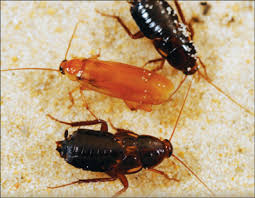Five Minutes With Sprague Entomologist Bobbie Orr, B.C.E.
Cockroaches have been the bane of many a property and QA managers existence for years. A resilient and persistent pest, cockroaches are found in numerous areas within commercial facilities. They are known to frequent dumpsters, garbage cans, grease traps, floor drains, trash rooms, water pipes, break rooms, desks and apartment kitchen cabinets and closets just to name a few.
In addition to being an annoyance, cockroaches can pose a serious health risk. While they forage, cockroaches pick up and transmit disease-causing bacteria like Salmonella, E. coli and other harmful pathogens, causing food borne illnesses and other health hazards. This makes them an extreme risk for commercial facilities, especially those involved in food processing and service.
While German and American cockroaches have been the primary threat to commercial facilities, another species has emerged as a threat, especially in California – Turkestan cockroaches. Sprague Regional Entomologist Bobbie Orr, B.C.E. offers the following information on this new threat.
Why are Turkestan cockroaches a threat to commercial accounts?
Contamination is the biggest threat to commercial accounts. If cockroaches are found in an audited food processing facility it could result in a failed audit or in the facility being shut down. Turkestan roaches are primarily an outdoor pest but as their population grows, they’ll forage as far as 100 ft. in search of food, water and harborage. This can lead them right to your facility’s door.
Where are Turkestan cockroaches most likely to be found in a commercial account?
Turkestan roaches are opportunists and can be found in a variety of locations in and around a facility. They do not discriminate between locations if they provide them with what they need. Orr has even found them in the bumpers and brushes under loading dock plates.
- Inside equipment with condensation pans (refrigeration units)
- Cracks or gaps in slabs or floors that hold water from cleaning or that allow water to get underneath.
- Gaps or holes in wall voids or openings in exterior walls
- In landscape debris or heavy mulch
- Dirty or clogged interior (near processing equipment) and exterior drains.
- Stacked pallets
- Dumpsters
- Electrical meter boxes or in-ground water valve boxes
How to do they gain access to a structure?
Turkestan cockroaches can gain access through gaps in the foundation, open doors or utility line openings. They can access a structure through the slightest of openings – all they need is an 1/8 of an inch opening.
What conditions contribute to a Turkestan cockroach infestation?
The most visible sign of a Turkestan cockroach infestation is when they are seen flying at nighttime near one of the previously mentioned locations. Other indicators include:
- Egg cases, legs and body parts from shed skins and cannibalism
- Harborage areas may not have excess moisture present – dry areas can attract Turkestan roaches. Dry pet food and debris under shelves in a pet food store.
- Roof drains may leak or gaps around pipes may provide access to wall voids.
- Clogged and dirty drains that retain moisture.
- Moisture behind cinder block walls
- Debris and trash at receiving docks and dirty trench drains providing warmth and moisture for breeding.
What can clients do to prevent or deter Turkestan cockroaches?
Clients can be their best advocate when it comes to preventing a Turkestan cockroach or any pest infestation by doing the following.
- Follow pest exclusion practices – seal cracks and openings, replace screens, install door sweeps and air doors.
- Make sure exterior maintenance tasks (cutting grass, trimming shrubs, picking up landscape debris, reducing mulch usage) are completed.
- Eliminate standing water and excess moisture.
- Create and follow a cleaning schedule that includes power washing once a month to dislodge organic debris from drains and cracks.
For more information on how Sprague Pest Solutions can assist you create and deliver an effective cockroach management program for your commercial property, call 855.805.0755.

